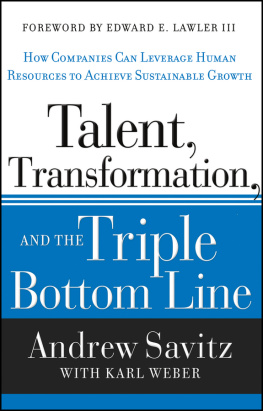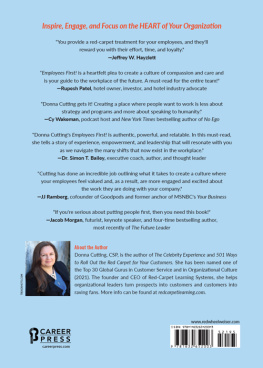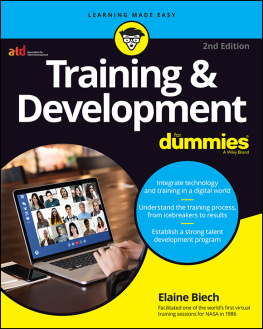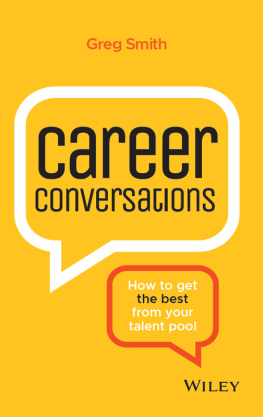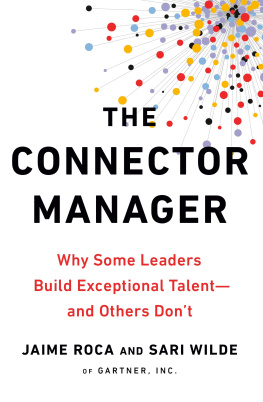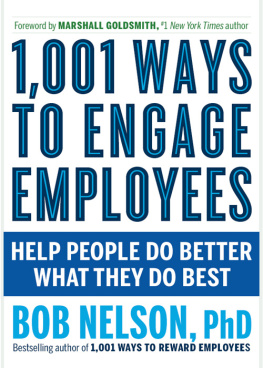20 Minutes to a Top Performer
Three Fast and Effective Conversations to MOTIVATE, DEVELOP, AND ENGAGE Your Employees
Alan Vengel


Copyright 2010 by Alan Vengel. All rights reserved. Except as permitted under the United States Copyright Act of 1976, no part of this publication may be reproduced or distributed in any form or by any means, or stored in a database or retrieval system, without the prior written permission of the publisher.
ISBN: 978-0-07-171321-4
MHID: 0-07-171321-2
The material in this eBook also appears in the print version of this title: ISBN: 978-0-07-162931-7, MHID: 0-07-162931-9.
All trademarks are trademarks of their respective owners. Rather than put a trademark symbol after every occurrence of a trademarked name, we use names in an editorial fashion only, and to the benefit of the trademark owner, with no intention of infringement of the trademark. Where such designations appear in this book, they have been printed with initial caps.
McGraw-Hill eBooks are available at special quantity discounts to use as premiums and sales promotions, or for use in corporate training programs. To contact a representative please e-mail us at bulksales@mcgraw-hill.com.
TERMS OF USE
This is a copyrighted work and The McGraw-Hill Companies, Inc. (McGraw-Hill) and its licensors reserve all rights in and to the work. Use of this work is subject to these terms. Except as permitted under the Copyright Act of 1976 and the right to store and retrieve one copy of the work, you may not decompile, disassemble, reverse engineer, reproduce, modify, create derivative works based upon, transmit, distribute, disseminate, sell, publish or sublicense the work or any part of it without McGraw-Hills prior consent. You may use the work for your own noncommercial and personal use; any other use of the work is strictly prohibited. Your right to use the work may be terminated if you fail to comply with these terms.
THE WORK IS PROVIDED AS IS. McGRAW-HILL AND ITS LICENSORS MAKE NO GUARANTEES OR WARRANTIES AS TO THE ACCURACY, ADEQUACY OR COMPLETENESS OF OR RESULTS TO BE OBTAINED FROM USING THE WORK, INCLUDING ANY INFORMATION THAT CAN BE ACCESSED THROUGH THE WORK VIA HYPERLINK OR OTHERWISE, AND EXPRESSLY DISCLAIM ANY WARRANTY, EXPRESS OR IMPLIED, INCLUDING BUT NOT LIMITED TO IMPLIED WARRANTIES OF MERCHANTABILITY OR FITNESS FOR A PARTICULAR PURPOSE. McGraw-Hill and its licensors do not warrant or guarantee that the functions contained in the work will meet your requirements or that its operation will be uninterrupted or error free. Neither McGraw-Hill nor its licensors shall be liable to you or anyone else for any inaccuracy, error or omission, regardless of cause, in the work or for any damages resulting there from. McGraw-Hill has no responsibility for the content of any information accessed through the work. Under no circumstances shall McGraw-Hill and/or its licensors be liable for any indirect, incidental, special, punitive, consequential or similar damages that result from the use of or inability to use the work, even if any of them has been advised of the possibility of such damages. This limitation of liability shall apply to any claim or cause whatsoever whether such claim or cause arises in contract, tort or otherwise.
For Kathleen and David
CONTENTS
FOREWORD
Now more than ever, we are forced to do more and more with less and less. We expect more from our employees with less training, more results with less time, more profits with less investment, and even more customer service with less effort on the part of (naturally) fewer employees!
The economic downturn has only made things more difficult for the increasingly burdened manager. So I was pleased to see that my colleague and long-time friend, Alan Vengel, has worked his magic in this new book. Why are these 20-Minute Conversations that Alan writes about in his book so important all the time? Why are they important in an up economyand doubly vital during a down economy? The times are indeed changing, and with change comes progressand with progress comes more work, harder work, and increasing pressures for the continually put-upon manager.
I remember when organizations had the luxury of being able to hire professional managers, managers who managed as their full-timeand onlyjob. Today we have what I call managers-plus: managers-plus-recruiters, managers-plus production specialists, managers-plus-cheerleaders, managers-plus-creative, managers-plus-plus!
This supersize, value-plus style of management isnt going away anytime soon. If you find yourself uncomfortable in the role of manager-plus-counselor-plus-coach-plus-motivator-plus-mentor, these ideas should make the part youre most uncomfortable with comfortable so that you dont avoid it.
Alans ideas enable todays busy managers to do something they havent done in quite some time: relax. The minute they hear 20 minutes, managers start to relax; the minute they hear five-minute prep, they start to relax even more. The more that managers can be provided with the tips, the tools, and the how-tos, the easier it will be for them to have these conversations along with everything else they have on their plate.
The best part is, these conversations arent rocket science; theyre what you do every day anyway, just with a little more guided focus. The importance of these conversations isnt so much in your technique or the setting or, occasionally, even the content; what really matters to your people is the conversation itself.
In my own research on retention and engagement, I continue to learn that its the conversation itself that makes people feel valued, needed, and appreciated. It can be as simple as a manager stopping for literally minutes to say, Heres what I appreciate; heres what you did well, even to those people we think already know how theyre doing. Quite often, they really dont know how theyre doing; just as often, your assumed lack of feedback can leave them stranded, thinking that theyre doing far worse than they actually areor far better. My research and that of my colleagues points over and over again to the fact that people dont leave organizations; they leave bad managers. What makes a bad manager? The manager who doesnt nurture, appreciate, coach, motivate, or mentor his or her people.
Alans book helps you do all of the aboveand then some.
Now, many managers who scan this book will probably think that they have heard all of this before. You know that your people need feedback. You know that you should be communicating with them more. You know that they need to be motivated and even mentored from time to time. You know this stuff but... have you done it lately? And if so, how lately? Last week, last month... or last year?
If it hasnt been in the last week or two, read on.
Workers of all ages want to learn; they understand that not all career paths lead to upward mobility, but they want to know that their careers offer other rewards, such as personal creativity, ownership of ideas, and the chance to be rewarded emotionally, professionally, and even creatively from time to time. If youre not holding frequent career conversations, you are probably making assumptions about what your employees really want.
In this economy, its critical to let people know how valued they are; 20 Minutes to a Top Performer will teach you how to let your people know that you value them, creatively and constructively, emotionally and effectively.


